
You are seeing this because you are…
Targeted advertisements are getting so specific they’ll choose the color of your next panties before you even knew you wanted them.
Who does Facebook think you are? Why is that baby clothing ad stalking you? What are the ethical implications and limitations of advertisements that already know what grabs your attention? We decided to dive into the world of Facebook's targeted advertising. Our first step was to put up our own ads demonstrating how advertisers could target us:
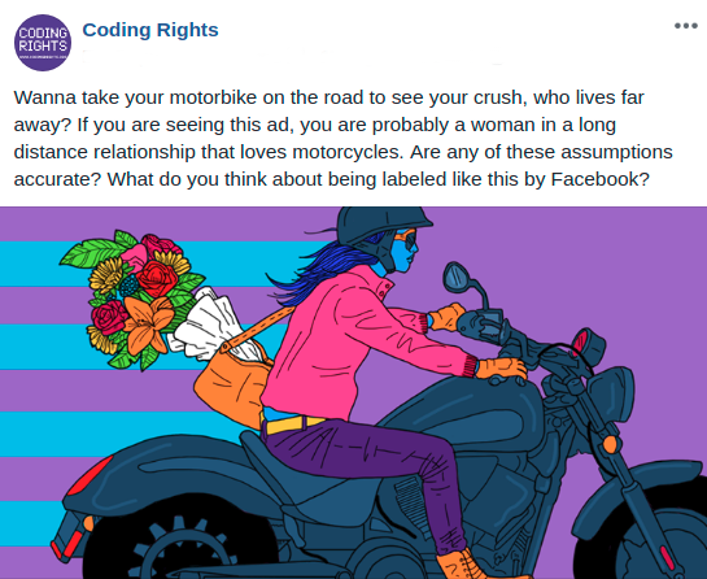
We wanted to assess the amount of detail about people's lives that Facebook could infer and market to advertisers. Using that information, we aimed to build a narrative using conversation topics that were so intimate that it would sound more like a conversation you might have with friends. The goal was to (slightly) shock people with humor, triggering a debate on how much Facebook knows about us and how that information is being exploited.
That's how questions like, "Are you getting along with your new boss?", "How's your cat?", and other conversation topics you might discuss with friends at a bar, started showing on Facebook and Instagram feeds in the form of sponsored ads:
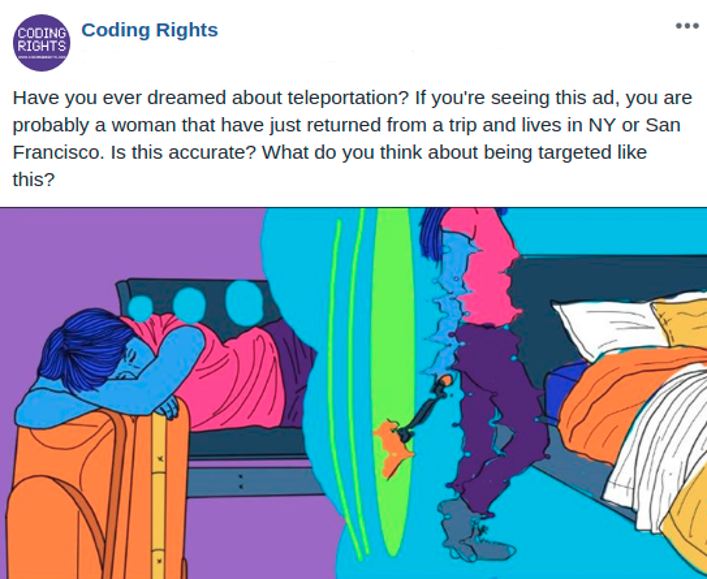
We seem to have hit the bull’s eye most of the time, both on the passionate biker ad and on the teleportation for travelers one:
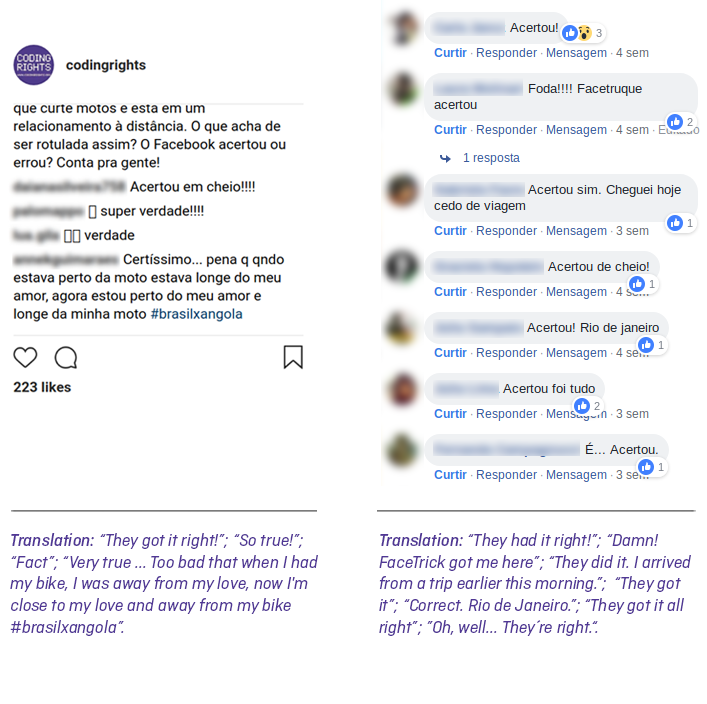 Then we started promoting a debate about what was happening:
Then we started promoting a debate about what was happening:

 Answering that question, here are details of the target audience we developed for the teleportation ad:
Answering that question, here are details of the target audience we developed for the teleportation ad:
 Here was the setup for the biker ad:
Here was the setup for the biker ad:
 Few people realize how detailed audience segmentation can be when targeting an advertisement. Using the basic options the Facebook ad manager provides, without uploading a contact list or using information from people who follow Coding Rights on social media (at least as far as we know), Facebook allows us to target, for instance, women who fit into the following categories: just got a new job, live away from family, prefer to pay their bills in cash or credit card, are mothers of teenagers, like expensive goods, like tattoos or yoga, and so on...
Few people realize how detailed audience segmentation can be when targeting an advertisement. Using the basic options the Facebook ad manager provides, without uploading a contact list or using information from people who follow Coding Rights on social media (at least as far as we know), Facebook allows us to target, for instance, women who fit into the following categories: just got a new job, live away from family, prefer to pay their bills in cash or credit card, are mothers of teenagers, like expensive goods, like tattoos or yoga, and so on...
With this level of detail, you could imagine a marketing campaign targeting, for instance, a "cat owner" who is "friends with newlyweds" and "Nigerian expats," a "mother" and "housewife" driving a "11 to 15 year old" "Volkswagen" minivan "bought in the last six months", or someone who is "newly employed" and "interested in "Muai Thai" and "distilled spirits." With access to these profiles, anyone could find lots of ways to start an engaging conversation.
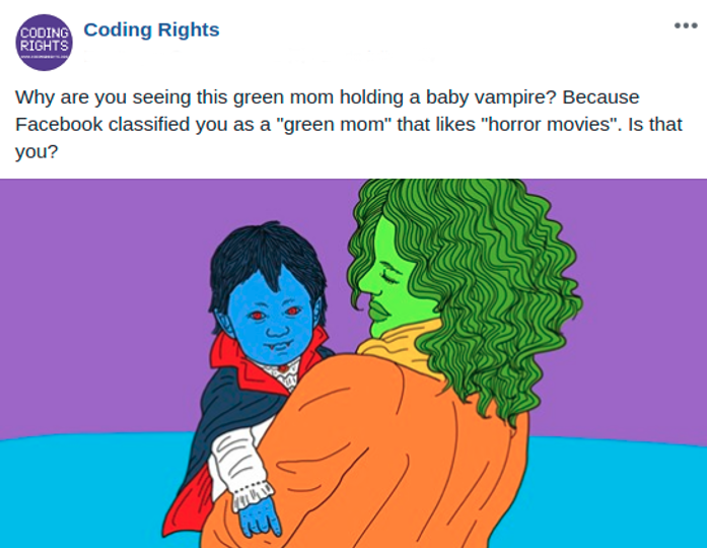
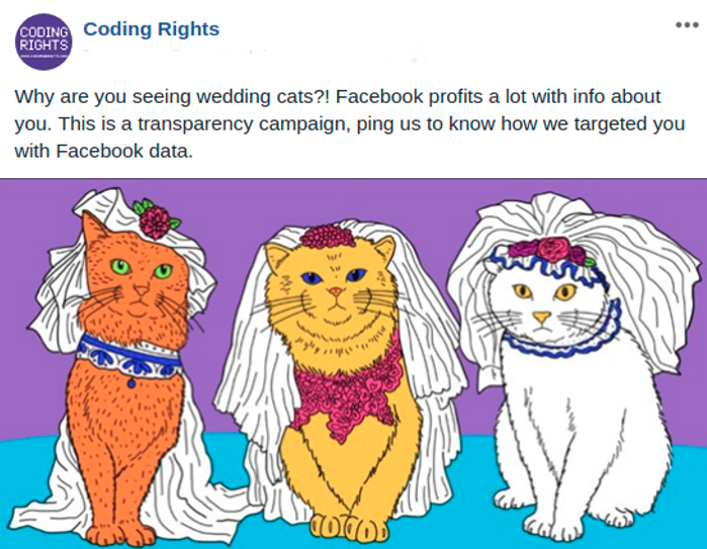
Our experiment with targeted ads used humor to raise awareness, utilizing the same tools advertisers use every day on Facebook. Then, for the second step in our research, we collected stories and screenshots on social media from people who felt they were seeing advertisements targeted specifically at women.
Are you (still) being exposed to strange ads just because you are a woman?
Rose* was browsing Facebook last year when she noticed something unusual: an advertisement with the tagline “donate your Asian eggs.” Rose was taken aback by the level of demographic detail advertisers were able to infer from just her Facebook profile.
In a previous article on Chupadados practices, we had already demonstrated how pregnant women are profitable for the advertising business. Now it seems that even before we get pregnant, some eggs can be valuable to advertisers. In the U.S, eggs that fertilization clinics classify as "Asian" are considered rare, costing more than twice as much as eggs of other ethnicities, to the point that several young people with that profile sell their eggs to pay for university.
The fact is it doesn't matter if you are, or have any desire to be a mother. Every stage of motherhood, from contraception to conception, gestation, childbirth, puerperium and childbearing, remains a topic to be exploited by advertisers while addressing bodies they consider to be female.
Another young woman, Hilary*, started seeing ads on Facebook for baby products like diapers and toys. Most of her friends from her religious community are married and starting to have children, but she says she doesn’t have plans to have children anytime soon. “I’m starting to get ads for baby products, which doesn’t apply to me at all,” says Hilary. “It’s like Facebook is trying to tell me what I’m interested in, which is weird.”
A popular news anchor had a similar experience, tweeting: "Facebook ads are there to remind women that from age 27-37, you ought to be having kids." She included the screenshot below of the explanation Facebook provides for why she was seeing an ad about play mats for babies. The explanation points out that she may be seeing this ad because the advertiser chose to display it to women between the ages of 27 and 37 who live or were recently in the U.S.
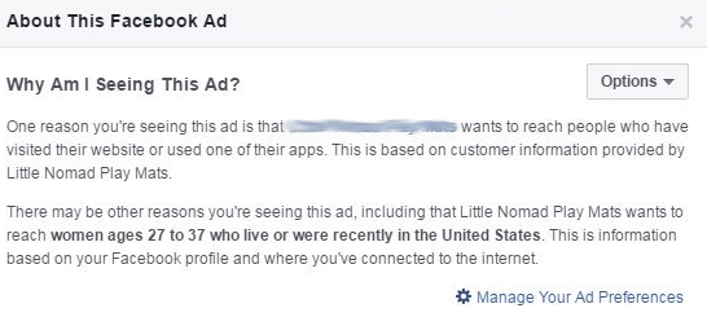 This situation is common. Through a partnership with the "Who Targets Me" project, we had the opportunity to access a database of targeted advertisements Facebook. Although the focus of the project is on political campaigns, the browser extension they developed collects all types of ads published for about 7,000 people who installed the tool, primarily in the UK. By searching the database to find ads for baby products, we hoped to determine whether they were targeted primarily at women.
This situation is common. Through a partnership with the "Who Targets Me" project, we had the opportunity to access a database of targeted advertisements Facebook. Although the focus of the project is on political campaigns, the browser extension they developed collects all types of ads published for about 7,000 people who installed the tool, primarily in the UK. By searching the database to find ads for baby products, we hoped to determine whether they were targeted primarily at women.
Baby-clothing advertisements:

Advertisements from stores selling all types of baby products and gears:

Baby care advertisements:
 We also searched for ads containing the word "fertility" and the results were similar. In both cases, the database confirmed that these ads were viewed more often by women, suggesting that advertisers on Facebook more often chose to target women with these ads. We did not find any ads in the database about babies or fertility targeting only men.
We also searched for ads containing the word "fertility" and the results were similar. In both cases, the database confirmed that these ads were viewed more often by women, suggesting that advertisers on Facebook more often chose to target women with these ads. We did not find any ads in the database about babies or fertility targeting only men.
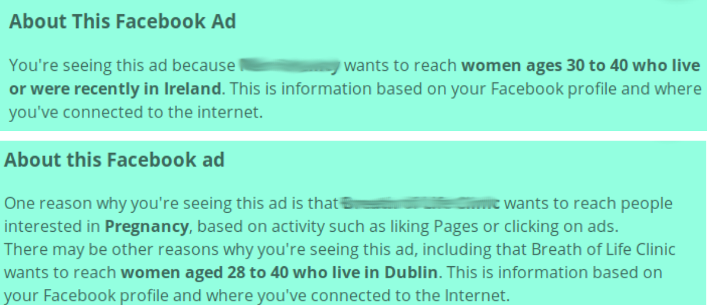
"I changed my gender on Facebook (for family only) to escape the baby/sperm donor ads", tweeted another woman. That comes as no surprise: even if we have moved past what should be considered ancient sexist ads, like the ads below that suggest women's work is limited to household activities:
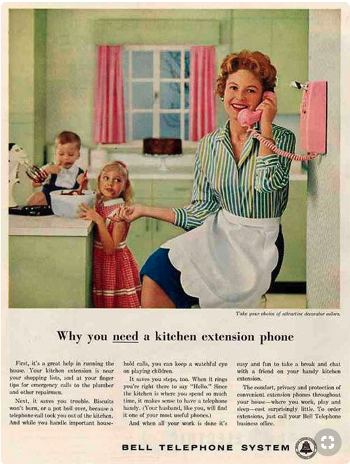
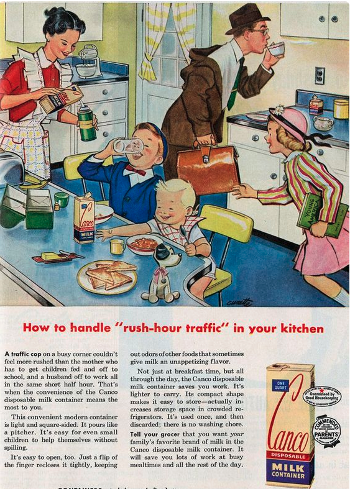 Sources: Envisioning the American Dream and Mad Men Art
Sources: Envisioning the American Dream and Mad Men Art
... And that some might think that advertising like these have become a little bit more gender-neutral:
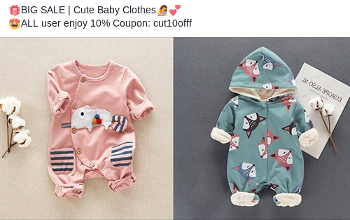
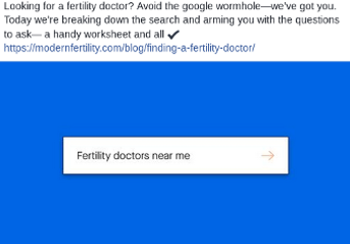
The truth is, if these ads only target women, there isn't much difference from the past, as they are reinforcing gender roles that have been questioned by the several feminisms. Gender-based advertising or ads that reinforce gender stereotypes are not a recent problem. For decades, patriarchal notions that extend to the market have objectified the woman's body, associating certain appearances with notions of beauty or sexuality, in many cases prescribing what physical or psychological health and illness look like. But when this happens under the guise of neutrality or objectivity, gender stereotypes and sexism become even more dangerous, hidden in the obscure logic of the algorithm.
Sometimes, similarities with the past are even more striking. A woman reported to us how outraged she was by the tone of the handbag advertisement below.
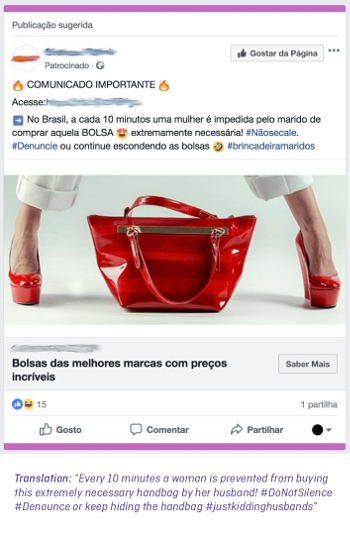
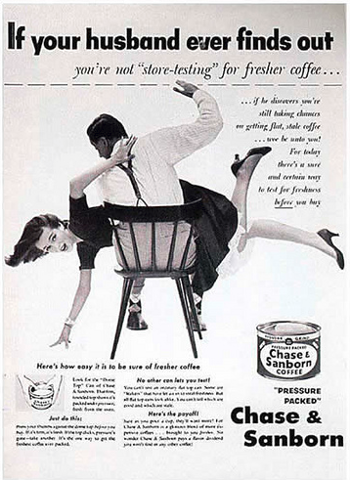 Source: Chase&Sanborn Ad
Source: Chase&Sanborn Ad
"This advertising is based on the assumption that the husband must authorize the purchase, that women have no autonomy over their expenses and jokes about campaigns to report violence against women. This is an extremely offensive advertisement", she says. "I am part of a number of support groups for women in abusive relationships, this [ad] could even indicate that I am experiencing abuse. [Were I] in such a situation, viewing that kind of ad would trigger an even worse feeling than the one that I already felt," she adds. It is indeed really sad to note that contemporary ads still use sexist jokes that underestimate gender based violence. This one really took us back to the 1950s, where people thought it was fun and ethical to portray violence against women to sell coffee.
Stories of discomfort are frequent. “Dear @facebook: the only time I’ve ever been pregnant I miscarried. Thanks for the stream of ads for new moms & women who hate their bodies,” tweeted Rachael, whom we later interviewed. As a dietitian who works with people who have eating disorders, she is attuned to the ways in which these messages can be harmful. “I feel particularly concerned about how these type of ads affect those prone to eating disorders & disordered eating,” says Rachael. She typically blocks those advertisers who are deliberately playing on women’s insecurity and self-hate, or who engage in body shaming.
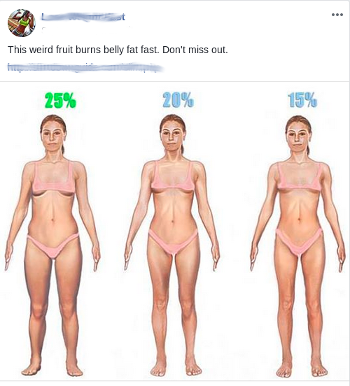
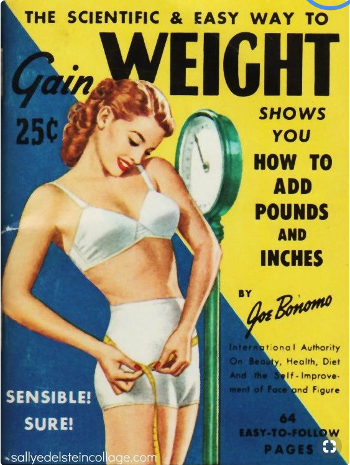 Source: Envisioning the American Dream
Source: Envisioning the American Dream
Any similarity among these ads is not incidental, time has passed, standards have changed from "gain weight" to "lose weight", but the message "be ashamed of your body", "buy this to change that", remains the same.
There are also multiple reports of women who seem to be targeted on Facebook for depression or anxiety. “Facebook shows me mostly ads about sadness,” tweeted Charlene. When we interviewed her, she said that the ads she most often sees are “those horrendous ‘counselling’ ones with the crying girl.” A number of women confirmed that they are shown ads with pictures of sad, weeping women.

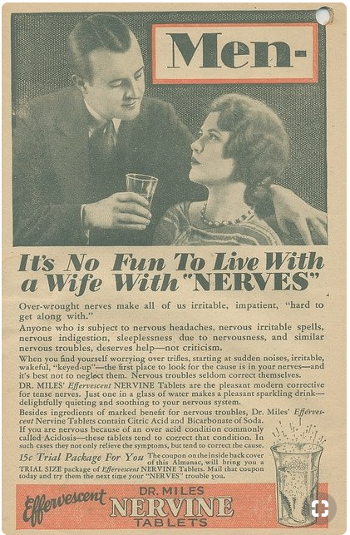 Fonte: Nervine advertisement
Fonte: Nervine advertisement
What has changed are the tools that are being used to reinforce misleading and even dangerous narratives around gender, bodies, sexuality, and motherhood. These sexist advertisements were scattered in magazines and newspapers in past decades. Today they are disseminated through algorithms that the advertisers themselves might not understand.
Wanna hide? Fuzzify!
Facebook’s ad platform enables advertisers to target us directly through our tastes, our life events, and our behaviors. As Facebook users, each of us is constantly producing data that feeds Facebook’s profile factory. This data allows us to be segmented and repackaged into problematic groups fitting us into binary, gendered, or sexist molds.
We have already seen catastrophic results from such practices, everything from the dissemination of sexist narratives by the advertising industry, to the crafting of political speeches aimed at targeting potential voters during election campaigns. We need more transparency on how this factory works.
For example, even if it looks otherwise, Facebook promotes gender binarism in the way it determines the possible audience categories for marketing campaigns. This is because although we can all choose our gender and pronouns in a non-binary way in our profiles, the ads manager only has the options "male" or "female":

 Gender selection on "about" and gender selection for marketers
Gender selection on "about" and gender selection for marketers
While some people are developing the idea of a data workers union to protest these practices, we have decided to develop a tool that helps us to better understand how we are being categorized and targeted by Facebook ads. It also allows us to mess with Facebook’s business model.
Fuzzify.me is a browser extension, available for Chrome and Firefox, which collects the advertisements that appear in our Facebook feed and displays them all together in a timeline. In some ads, you can access information about why you were targeted by that piece.
Seeing all the ads together makes it easier to know who Facebook thinks you are and how they sell your data profile.
If what you've seen has bothered you or you simply do not want to remain part of this system, fuzzify.me also helps you clear out all the categories assigned to your profile that are visible to advertisers. Although Facebook itself also allows you to clear out these categories, it’s a manual process you would need to repeat regularly, since the platform constantly assigns you new ad preferences according to your browsing history.
Fuzzify.me removes all those categories quickly and in one go. If you want, you can also enable reminders to clean as frequently as you’d like. While ad blockers were built to prevent you from seeing ads that are targeting you, fuzzify.me operates in an early stage of the ads chain by not giving advertisers access to the ad categories that Facebook assigns to you.
Over time, you'll be able to see whether the types of ads you're viewing have changed based on what categories and information you've deleted. The goal is to determine whether or not the tools Facebook says will help us control our privacy online are actually effective at protecting us. Have you discovered anything strange using fuzzify.me? Let us know!
Credits
Text by Joana Varon and Becca Ricks
Ads Experiment by Joana Varon and Carol Monteiro
Ads Illustration by Clara Juliano
Ads Research by Joana Varon and Becca Ricks
Extension Development by Hang Do Thi Duc
Extension Concept by Hang Do Thi Duc, Becca Ricks and Joana Varon
Fuzzify Video by Joana Varon and Clara Juliano
Video VoiceOver by Becca Ricks
Translations by Trajano Pontes
Special Thanks to Brett Gaylor, Kevin Zawacki and Who Targets Me